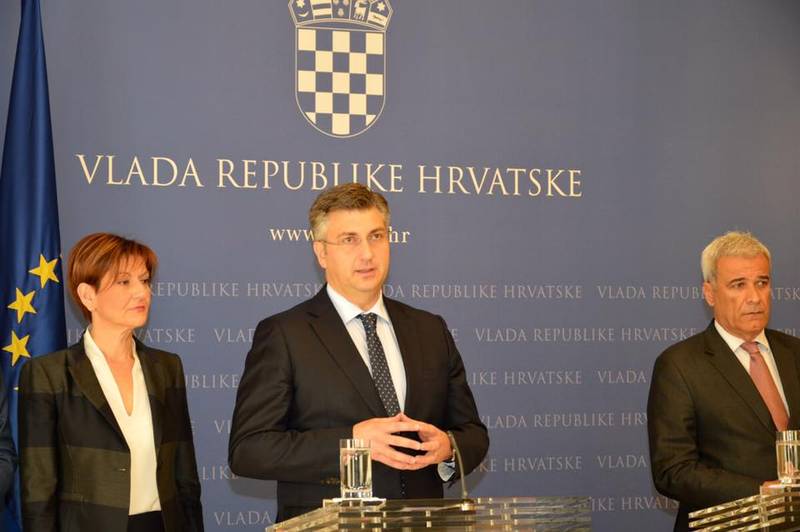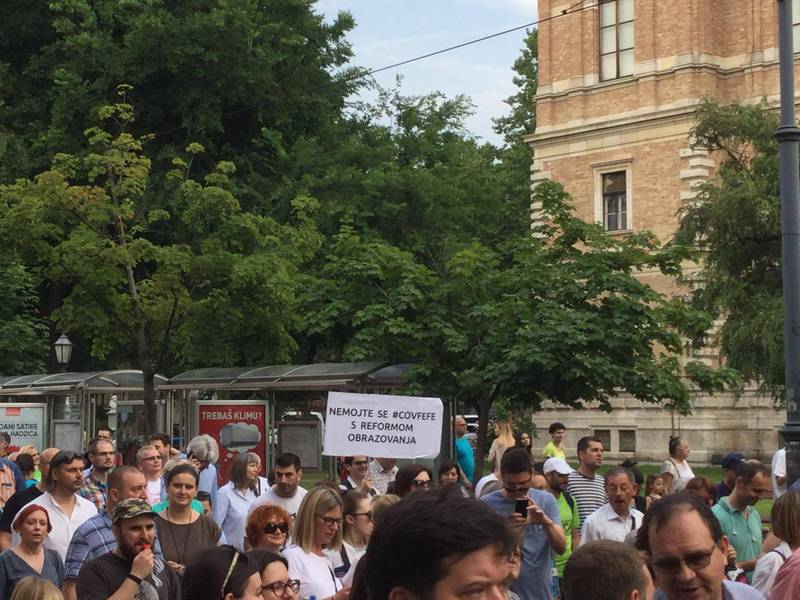More Uncertainty in Croatia after the 2nd Round of Local Elections
Adelina Marini, June 6, 2017

The Conservative Croatian Democratic Union (HDZ) party is the biggest and convincing winner in the second round of the local elections in the country, but the dilemma remains at national level whether a stable coalition partner will be found or snap elections will be the way to go. The government of Andrej Plenković, which finds itself in vacuum due to the collapse of the coalition with Most of Independent Lists (Most NL), hoped that the outcome of the local elections would resolve this dilemma, but now everything depends on the survival of the Liberals - the Croatian People's Party (HNS/ALDE).
Winners and losers
HDZ has improved its results from the previous local elections in 2013 holding 12 out of the 20 županija (counties), and in a 13th county it has won the election in coalition. Conservatives have mayors in 62 of 128 towns, which is five more than 2013. HDZ is the winner in 195 of 428 municipalities. In Zagreb, the party lost in the first round. All other parties are losers. The second largest political force - the Social Democratic Party (SDP) - under the leadership of Davor Bernardić has confirmed the trend in Europe for a decline of the social democratic forces. The party has worsened its performance compared to 2013, and, as Croatian media reported, its performance no longer corresponds to its claims at national level.
Serious losses were also sustained by their until recently loyal coalition partner – the liberals from HNS, led by Ivan Vrdoljak, former deputy prime minister and minister of economy in the government of Zoran Milanović. Their biggest loss is in Zagreb where their candidate Anka Mrak-Taritaš, supported by the SDP, lost by a close margin from the irreplaceable and already quite arrogant Mayor Milan Bandić, who managed to win a sixth consecutive term. According to Croatian media and analysts, one of the main reasons for the loss of Mrak-Taritaš is in rumours, which were subsequently confirmed, about a ruling coalition being prepared between HDZ and HNS. These speculations led to a split in the liberal party itself as well.
Part of its leadership, including deputy chairwoman Anka Mrak-Taritaš, honorary chairwoman Vesna Pusić and other prominent HNS-ers, strongly opposed a coalition with HDZ. Their fears are that this will lead them to extinction from the political scene. Besides, to them the HDZ is an ideological adversary. HNS performed well in the parliamentary elections last year, although the People's Coalition, in which they participated with the SDP, lost the election. Members of the Liberals were among the most successful candidates in the preference vote. The party has 9 MPs in parliament that are enough to form a ruling majority with HDZ, who already have minority representatives and some minor parties on their side, but they are lacking just a few votes.
Liberals face the dilemma whether to join the HDZ, for early elections could bring them worse results, or they stick to their principles. According to the latest poll released on Monday, support for liberals dropped from 3.6% to 3.0% compared to the previous month. This week, the party will meet at all its levels of management, with Ivan Vrdoljak announcing that he is betting his mandate on the upcoming  talks. If the HNS refuses to take part in government, it almost certainly means going to the election booths once more - the third time in the last two years.
talks. If the HNS refuses to take part in government, it almost certainly means going to the election booths once more - the third time in the last two years.
Another big loser in the local elections with great effect for its future at national level is Most NL, which even managed to lose their fortress Metkovic (in the Dubrovacko-Neretva County) and to the HDZ at that. Possible snap parliamentary elections could spell the end for this party, which had a promising future as a balancer and reformer, but it turned out to be a protest movement that cannot act constructively. Support for them has fallen from 10.2% a month ago to 7.2% in June.
The large stakes - education
The biggest casual winner of a possible coalition with HNS might be ... education. According to reports in Croatian media, Liberal leader Ivan Vrdoljak has negotiated with HDZ several key positions in the government, including the deputy prime minister's seat and that of the minister of education. The issue has been particularly hot since HDZ took power, and this unleashed a serious battle against conservative currents in the party. As soon as it came to power a year ago, the HDZ-led government fired the author of a massive curricular reform in education that included a complete makeover of the content of textbooks from the first-grade all the way to secondary education graduation.
This unleashed an unprecedented mass protest in many Croatian cities. According to official data, over 50,000 people joined the protest last year. Shortly after, the government fell, new elections were held, a new government came, but the reform was not on the top of the agenda. Recently, Andrej Plenković's government has once again angered the pro-reform community after the education minister appointed as a leader of the reform, in a non-transparent manner, a figure considered controversial by the reformists. The protest was repeated again last week on the same date - June 1. This year, in Zagreb, the protest passed in the form of a procession from the central square Ban Jelačić to the central central railway station. The aim was to symbolise the massive brain drain from Croatia.
According to police, 20 000 people joined the protest in Zagreb. According to organisers and participants, the reason for the smaller number of protesters lies namely in the fact that, since the labour restrictions for Croats have disappeared in some EU member states, more and more of Croats are leaving the country. Another reason was the weather - it hailed in the centre of the city just minutes before the start of the protest. There is also a third reason - some criticised the organisers for holding the protest just days before the second round of local elections and suspected a political element.
Ivan Vrdoljak, the leader of the Liberals, was one of the most prominent supporters of the protest, and one of the government's most vocal critics for failing to carry out the education reform proposed by the government in which he was deputy prime minister. Hence, HDZ's nomination of a HNS man taking up education and carrying out the reform to their taste is very tempting. It puts Liberals at a serious dilemma - whether to risk their party  in the name of the reform, with the additional risk of not having enough freedom to implement it, or try their hand at new elections.
in the name of the reform, with the additional risk of not having enough freedom to implement it, or try their hand at new elections.
If the HNS agrees to participate in the government at this price, it will also be very convenient for the prime minister, who has so far not dared to dismiss the education minister, despite numerous criticisms against him, one of which is for plagiarism and the other one because of the fact that he is working to replace the liberal educational reform with a conservative revolution. Plenković has so far been silent about both the educational reform as a whole and the protests as well.
Agrokor
Possible snap elections could also have a negative impact on the crisis in the Agrokor conglomerate, which is currently run by a government commissioner whose task is to restructure the company. Political uncertainty may slow down this process and trigger a new crisis unless agreements with creditors and suppliers are reached. Tensions around the group have not yet dissipated, and are even increasing as Russian Sberbank demanded that the state took over the debts of the conglomerate if it is taking over the management. The situation with Agrokor is of not just national, but also of a regional scale.
Polls are showing that HDZ currently has the highest support of 34%, which has grown compared to May (30.8%). SDP is second with support of 24.8% (24.1% in May). It seems that besides Most NL, the anti-establishment and Eurosceptic Living Wall party, whose support dropped from 7.6% in May to 6.1% in June, has also reached the end of its path. A possible ruling coalition with HNS could establish HDZ as a centre-right formation, as Prime Minister Plenković is trying to present it.
Translated by Stanimir Stoev
 Kolinda Grabar-Kitarovic | © KGK
Kolinda Grabar-Kitarovic | © KGK Jozo Rados | © European Parliament
Jozo Rados | © European Parliament Aleksandar Vucic, Andrej Plenkovic | © Vlada RH
Aleksandar Vucic, Andrej Plenkovic | © Vlada RH